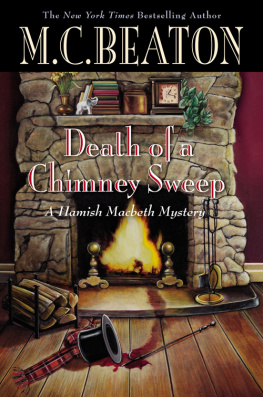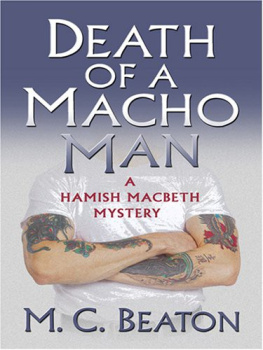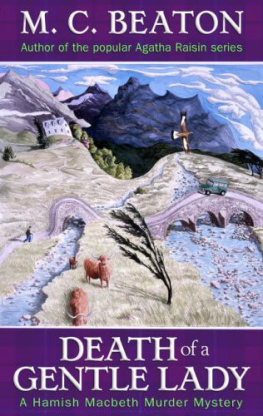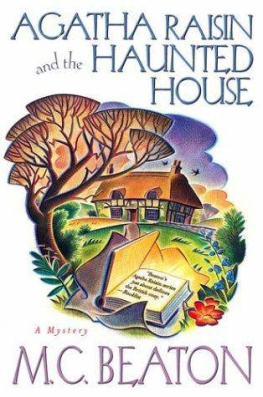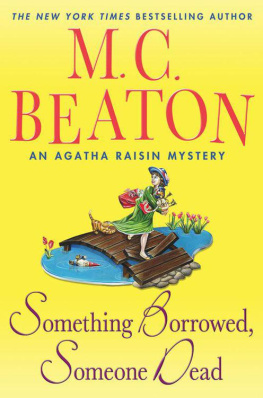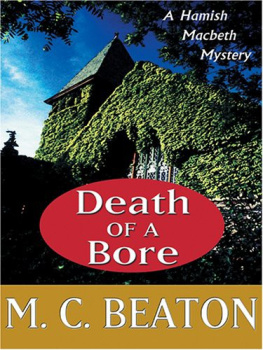M. C. Beaton - Death of a travelling man
Here you can read online M. C. Beaton - Death of a travelling man full text of the book (entire story) in english for free. Download pdf and epub, get meaning, cover and reviews about this ebook. year: 1993, publisher: St. Martins Press, genre: Detective and thriller. Description of the work, (preface) as well as reviews are available. Best literature library LitArk.com created for fans of good reading and offers a wide selection of genres:
Romance novel
Science fiction
Adventure
Detective
Science
History
Home and family
Prose
Art
Politics
Computer
Non-fiction
Religion
Business
Children
Humor
Choose a favorite category and find really read worthwhile books. Enjoy immersion in the world of imagination, feel the emotions of the characters or learn something new for yourself, make an fascinating discovery.

- Book:Death of a travelling man
- Author:
- Publisher:St. Martins Press
- Genre:
- Year:1993
- Rating:4 / 5
- Favourites:Add to favourites
- Your mark:
- 80
- 1
- 2
- 3
- 4
- 5
Death of a travelling man: summary, description and annotation
We offer to read an annotation, description, summary or preface (depends on what the author of the book "Death of a travelling man" wrote himself). If you haven't found the necessary information about the book — write in the comments, we will try to find it.
Death of a travelling man — read online for free the complete book (whole text) full work
Below is the text of the book, divided by pages. System saving the place of the last page read, allows you to conveniently read the book "Death of a travelling man" online for free, without having to search again every time where you left off. Put a bookmark, and you can go to the page where you finished reading at any time.
Font size:
Interval:
Bookmark:
Title:
Death of a Travelling Man
Series:
The ninth book in Hamish Macbeth series
Author:
M. C. Beaton
Year:
1993
Synopsis:
Police Sergeant Hamish Macbeths new promotion means more money, but it also means that an eager beaver of a policeman has been thrust upon him, interfering with Hamishs easygoing way of life. Fans of the lazy Hamish will delight in seeing him pitted against a zealous young officer while solving a disturbing murder.
From his brimstone bed, at break of day,
A-walking the Devil is gone,
To look at his little snug farm of the World,
And see how his stock went on.
Robert Southey
P olice Sergeant Hamish Macbeth was never to forget that fine spring day. It was the day the devil came to Lochdubh.
Hamish was strolling along the waterfront of the tiny Highland village, glad to be free for a brief spell from the bloodhound efficiency of his sidekick, PC Willie Lamont. Although his promotion to sergeant had meant more pay, it had also meant that this eager beaver of a policeman had been thrust upon him, interfering with Hamishs easygoing life and home. Willie was also a cleanliness fanatic and Hamish was tired of living with the all-pervading smell of disinfectant.
The day was fine and warm, unusual for March in the Highlands. Snow glittered on the twin peaks of the mountains which soared above the village, and the sea loch lay calm and placid in the morning sun. Peat smoke rose from cottage chimneys, seagulls swooped and dived.
And then Hamish saw it, parked in front of what was once the Lochdubh Hotel, still up for sale. It was a battered old bus which had been converted into a travelling home. At one time in its career the bus had been painted psychedelic colours but even these had faded into pastel streaks overlaid with brown trails of rust.
Hamish went up to it and knocked at the door. The door jerked open. A tall man smiled down at Hamish. He was incredibly handsome. Jet black hair grew to a widows peak on his forehead. His eyes were green, grass-green without a fleck of brown in them. His face and arms were tanned golden-brown. He was wearing a blue-and-white checked shirt and blue jeans moulded to long muscular legs.
You are not allowed to park here, said Hamish, wondering why he should take such an instant and violent dislike to this handsome man.
I am a traveller, the man said in a cultivated English voice. My name is Sean Gourlay.
Hamishs face hardened. Sean would have been called a hippie not so long ago and a beatnik a long time before that. Now he belonged to that unlovable crowd who euphemistically referred to themselves as travellers, the itinerant race who descended on places like Stonehenge complete with battered unlicensed vehicles, dirt, drugs and dogs. To some charitable souls who had never had their sheep ripped apart by dogs or their land turned into a sewer, the travellers carried with them an aura of romance, like the gypsies they pretended to be. Living on the dole, they travelled aimlessly from place to place. The reason these nomadic layabouts claimed to be travellers or sometimes new travellers was that they demanded the privileges and camping rights given to gypsies, privileges often dating back centuries. Hamish was tolerant of gypsies and knew them all. He had no time for these so-called travellers.
You are not a gypsy, said Hamish, and therefore have no rights. This is private property.
A girl squeezed in beside Sean at the doorway. She had straggly sun-bleached hair, a small dirty face, and a thin, flat-chested body.
Get lost, pig, she said, in the guttural accents of Glasgow.
Hamish ignored her. He addressed himself to Sean. I can direct you to a place up on the moors where you can camp.
Sean gave him a blinding smile. But I like this village, he said.
And so do I, retorted Hamish, which is why I am ordering you to move on. Lets see your driving licence.
A stream of four-letter words erupted from the girl. Sean dug into the back pocket of his jeans and produced a clean new driving licence, issued only a few months ago. The girl had now jumped down from the bus. She was very small in stature. She leapt up and down in front of Hamish, cursing and yelling. Pig was the politest epithet. There was a peculiar, almost sinister magnetism about Sean. He paid no attention to the girl whatsoever and Hamish found himself doing the same. He examined Seans insurance and the road-tax disc on the bus. Both were in order.
He handed back the papers and said firmly, Now, get moving.
Sean grinned. Certainly, officer.
The girl told Hamish to perform an impossible anatomical act on himself and then suddenly bolted back into the bus, like some small hairy animal darting into its lair.
Pay no attention to Cheryl, said Sean lazily. Rather an excitable type.
Her full name? snapped Hamish.
Cheryl Higgins, like the professor.
Hamish waited until Sean had climbed into the drivers seat, and the bus clattered off. He stood with his hands on his hips and watched it go. Then he shook his head. He should not have allowed Sean to upset him. If they parked up on the moors, they would not stay long. He knew the travellers preferred to be with their own kind. It was unusual to find just two of them and one old bus. This fine weather was unusual. Soon there would be the lambing blizzard, that last vicious fall of snow which always arrived in the late spring to plague the shepherds.
His mind turned to the problem of PC Willie Lament. He would not have minded at all having a helper. All policemen, however crime-free the area they lived in, were landed with a lot of paperwork. Hamish regarded the police station as his home, his own home, and he wished he could manage to get Willie to live somewhere else in the village. As he ambled back again in the direction of the police station, he saw that his dog, Towser, was once more tied up in the garden. Poor Towser was always being banished outside these days, thought Hamish. Willie must be scrubbing the floorsagain. He decided to go up to Tommel Castle Hotel where his friend, Priscilla Halburton-Smythe, was working in the hotel gift shop. Priscillas father, Colonel Halburton-Smythe, had turned his home into a hotel to recoup the vast losses he had made by trusting his money to a charlatan. The hotel had prospered, having excellent shooting and fishing and high enough charges to appeal to the snobbish and the parvenues who thought the colonels high-handed manner with his guests was a sign of true breeding, rather than the mixture of arrogance and sheer bloody-mindedness that it, in truth, was.
As he unhitched Towser and led the dog to the police Land Rover, Hamish reflected sadly that having Willie in the police station was like being married to a nag of a wife. Archie Maclean, the fisherman, spent most of his time either in the pub or sitting on the harbour wall to get away from his wifes perpetual cleaning.
The new gift shop was a pleasant place, full of the very best of Scottish goods: Edinburgh crystal, Caithness glass, silver jewellery, fine woollens, along with a multitude of cheaper goods for the tourist to take homeshortbread, locally made fudge, guidebooks, postcards, souvenir pens and pencils, and stuffed toys.
Priscilla was wearing her new tourist uniform of frilled white shirt and short tartan skirt. Hamish wondered what the tourists made of her, this graceful woman with the smooth blonde hair and the superb figure who looked as if she had stepped out of the pages of Vogue.
She saw Hamish and smiled. Ive had a coffee machine put in here. You must have got word of it.
I am not mooching, said Hamish, who nearly always was. But I will have the coffee, nonetheless.
What brings you here, Sergeant? asked Priscilla as she poured two mugs of coffee. She never tired of calling him Sergeant these days, he reflected. He knew she took his promotion as a sign that he had finally come to his senses and decided to be ambitious.
Next pageFont size:
Interval:
Bookmark:
Similar books «Death of a travelling man»
Look at similar books to Death of a travelling man. We have selected literature similar in name and meaning in the hope of providing readers with more options to find new, interesting, not yet read works.
Discussion, reviews of the book Death of a travelling man and just readers' own opinions. Leave your comments, write what you think about the work, its meaning or the main characters. Specify what exactly you liked and what you didn't like, and why you think so.

